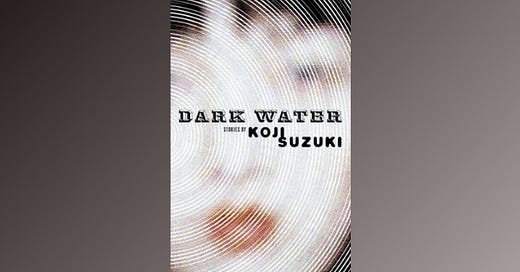Rating: ⭐⭐⭐ (3.5)
Genre: Horror
Key topics/tropes: Paranormal, dysfunctional family
Grade: Adult
Published: 1996
Length: 282 pages
Format Read: Print (translated by Glynne Walley)
POV: Third, multiple perspectives
Reread: ✅
Content warnings & important topics (More listed in Spoiler section)
Death
Links
Summary
A collection of seven short horror stories, all featuring water imagery:
Floating Water — A mother moves to a new apartment with her daughter and learns that a small girl disappeared from the building a year ago.
Solitary Isle — A man discovers the truth behind his recently-deceased friend’s claim that he stranded his girlfriend on an abandoned island.
The Hold — A fisherman who abuses his family tries to figure out where his wife has disappeared to.
Dream Cruise — A couple tries to rope a man into their pyramid scheme by inviting him onto their yacht.
Adrift — A fishing boat crew comes across an abandoned yacht.
*Watercolors — A sound tech investigates a mysterious interruption during his theater troupe’s opening performance.
*Forest Under the Sea — Two spelunkers find themselves trapped in an unexplored cave.
*My favorite stories
Review
I had a mild appreciation for most of the stories, but overall, I didn’t feel the strong emotional reactions I like to have while reading horror. On the other hand, I loved the concept of having water as a motif throughout the stories and appreciate the different ways Suzuki depicted water as a horror element in the various settings.
Horror is one of those genres in media that’s hard for people to find satisfying, especially in books, even more so in short stories. There are no sudden jump scares from visuals or auditory cues, like in TV and movies. There’s just a limited amount of time and page space to create a spooky atmosphere and engaging-enough plot.
So it feels like an unfair ‘criticism’ to say some of the story twists were predictable, but I also don’t see that as a criticism either. Even in the stories where I predicted the twists, Suzuki is still effective in creating the spooky atmospheres and engaging-enough plots that I wanted to see how the twists were revealed, and then resolved (if they were resolved at all).
The criticism I do feel is fair to assign is my classic gripe with Suzuki’s writing. I’ve read six of his horror books so far and there’s a clear running theme in his characters: The men are generally terrible to women and the women mostly just exist as secondary to the men.
In Dark Water, the male characters’ behaviors run the gamut:
Stranding a pregnant girlfriend on an isolated island (Solitary Isle)
Maintaining a friendship with the man who stranded his girlfriend (Solitary Isle)
Physically abusing a wife (The Hold)
Witnessing and allowing physical abuse of a female colleague (Watercolors)
Sexualizing a woman outside of a sexual context, a standard of Suzuki’s writing (Watercolors)
To be gracious, there is one story in Dark Water from the POV of a woman (Floating Water) and Suzuki may just be more comfortable writing from a male POV as a man himself. To be extra gracious, maybe writing terrible men is his ‘thing’.
But seeing other aspects of his writing, I think he has a creative mind, and surely there are other ways to write men as unlikeable characters without involving negative treatment/views toward women.
I think Suzuki’s creativity shows most in the range of water-related scenarios depicted. Most stories take place in/near bodies of water, and the others have water as a motif to introduce the horror elements.
Suzuki effectively captures the natural ominousness of bodies of water, but he was also effective in making everyday water feel creepy. Even now, I look at my daily water bottle, suspicious of any nefarious secrets it could be hiding.
I’d recommend Dark Water for anyone looking for a quick and spooky character-driven read. I wouldn’t recommend it for anyone who needs ‘satisfying’ endings or needs their horror to be ‘scary’. It’s definitely spooky and you might not want to look overboard next time you’re on a boat, but it’s not going to keep you up at night looking for shapes in the shadows. Unless you live on a boat 😈
Author Rep Notes
Koji Suzuki is Japanese.
Character Rep Notes
All characters are Japanese.
Also by Koji Suzuki:
Ring (Ring #1)
🚫 Spoilers ahead
Additional content warnings:
Child abuse
Child death
Emotional abuse
Misogyny
Physical abuse



